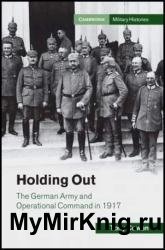 Название: Holding Out: The German Army and Operational Command in 1917 Название: Holding Out: The German Army and Operational Command in 1917
Автор: Tony Cowan
Издательство: Cambridge University Press
Серия: Cambridge Military Histories
Год: 2023
Страниц: 359
Язык: английский
Формат: pdf
Размер: 10.2 MB
This is a ground-breaking study of German operational command during a critical phase of the First World War from November 1916 to the eve of the third battle of Ypres. The situation faced by the German army on the Western Front in 1917 was very different from the one anticipated in pre-war doctrine and Holding Out examines how German commanders and staff officers adapted. Tony Cowan analyses key command tasks to get under the skin of the army's command culture, internal politics and battle management systems from co-ordinating the troops, matériel and different levels of command needed to fight a modern battle to continuously learning and applying lessons from the ever-changing Western Front. His detailed analysis of the German defeat of the 1917 Entente spring offensive sheds new light on how the army and Germany were able to hold out so long during the war against increasing odds.
At 5.30 a.m. on 9 April 1917, a wintry Easter Monday, British and Canadian troops advanced to assault the German positions at Arras. Within two days they had seized the important Vimy Ridge, and further south had broken through all the prepared German defensive positions in the area. They had made the longest advance by Entente forces in a single day since trench warfare had begun on the Western Front, capturing thousands of prisoners and hundreds of guns. This was victory, and the British commanders gave orders that risks must be freely taken in the pursuit of the defeated enemy.
On the German side, something like panic set in. The commander of the forces facing the British, Crown Prince Rupprecht of Bavaria, asked himself anxiously in his diary whether his troops would be able to hold further attacks, and even whether it made sense to continue the war. First Quartermaster-General Erich Ludendorff described the situation as extremely critical; he had looked forward to the offensive with confidence, based on the recent introduction of new defensive tactics, and was now deeply depressed. His chief, Generalfeldmarschall Paul von Hindenburg, hinted at Ludendorff’s shaken nerves: ‘I pressed the hand of my First Quartermaster-General with the words: “We have lived through more critical times than to-day together.” To-day! It was his birthday!’
Скачать Holding Out: The German Army and Operational Command in 1917
|